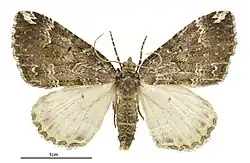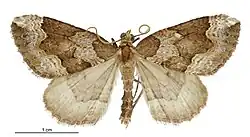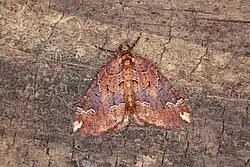Austrocidaria haemophaea
| Austrocidaria haemophaea | |
|---|---|

| |
| Female | |

| |
| Male | |
| Scientific classification | |
| Kingdom: | Animalia |
| Phylum: | Arthropoda |
| Class: | Insecta |
| Order: | Lepidoptera |
| Family: | Geometridae |
| Genus: | Austrocidaria |
| Species: | A. haemophaea
|
| Binomial name | |
| Austrocidaria haemophaea | |
| Synonyms[2] | |
| |
Austrocidaria haemophaea is a species of moth of the family Geometridae.[2] It endemic to New Zealand and is found on the Chatham Islands. Adults are on the wing in December and June.
Taxonomy
This species was first described by Edward Meyrick in 1925 and originally named Hydriomena haemophaea.[3] George Hudson discussed and illustrated this species under that name in his 1928 book The butterflies and moths of New Zealand.[4] Louis Beethoven Prout discussed this species under the name Euphyia haemophaea.[5] In 1971 John S. Dugdale placed this species in the genus Austrocidaria.[6] The male holotype, collected at Whangamarino on Chatham Island by Stewart Lindsay, is held at the Canterbury Museum.[2]
Description
.jpg)
Meyrick described the adult of this species as follows:
♂ 34 mm. Head, palpi, thorax light reddish-ochreous. Forewings with termen hardly bowed, little oblique, slightly waved ; reddish-ochreous ; a basal patch of grey curved transverse striation, edge obtusely angulated in middle, edged by an ochreous-whitish stria ; space between this and median band suffused light greyish ; median band suffused grey, with darker grey striae, broad on costa, and becoming narrower downwards, edged by reddish-ochreous striae, anterior with acute angulations outwards above and below middle and inwards in middle, posterior partly marked white, rather irregularly waved, with short broad obtuse double prominence in middle ; discal mark small, blackish, transverse ; a subterminal fascia of grey suffusion connected with termen by suffused dark grey bars ; an irregular white costal spot just before apex, tinged reddish on costa (cilia imperfect). Hind wings ochreous grey-whitish, towards termen slightly reddish-tinged ; a dark grey discal dot ; a subterminal series of faint cloudy greyish spots ; cilia reddish-whitish.[3]
Distribution

A. haemophaea is endemic to New Zealand.[1] It has been observed on the Chatham Islands including on Chatham Island and Pitt Island.[4][7]
Hosts
As at 1971 the larval host of this species is unknown.[6]
Behaviour
The adults of this species are on the wing in December and June.[4][8]
References
- ^ a b "Austrocidaria haemophaea (Meyrick, 1925)". www.nzor.org.nz. Retrieved 2022-02-20.
- ^ a b c Dugdale , J. S. (23 September 1988). "Lepidoptera - annotated catalogue, and keys to family-group taxa". Fauna of New Zealand. 14. Department of Scientific and Industrial Research: 175. doi:10.7931/J2/FNZ.14. ISSN 0111-5383. Wikidata Q45083134.
- ^ a b Edward Meyrick (1925). "Lepidoptera of the Chatham Islands". Records of the Canterbury Museum. 2 (5): 270–271. ISSN 0370-3878. Wikidata Q110706860.
 This article incorporates text from this source, which is in the public domain.
This article incorporates text from this source, which is in the public domain.
- ^ a b c Hudson, G. V. (1928), The butterflies and moths of New Zealand, Illustrator: George Hudson, Wellington: Ferguson and Osborn Limited, p. 101, LCCN 88133764, OCLC 25449322, Wikidata Q58593286BHL page 61899712
 This article incorporates text from this source, which is in the public domain.
This article incorporates text from this source, which is in the public domain.
- ^ Prout, L.B. 1934-1939. Die Spanner des Palaearktischen Faunengebietes. In: Seitz, A. (Ed.), Die Gross-Schmetterlinge der Erde. Supplement zu Band 4: 289.BHL page 12779961
- ^ a b Dugdale, J. S. (10 November 1971). "Entomology of the Aucklands and other islands south of New Zealand: Lepidoptera, excluding non-crambine Pyralidae". Pacific Insects Monographs. 27: 97. ISSN 0078-7515. Wikidata Q64006453.
- ^ Stewart Lindsay (1930). "List of the Lepidoptera of Pitt Island, Chatham group". Records of the Canterbury Museum. 3 (4): 253–254. ISSN 0370-3878. Wikidata Q135644299.
- ^ "Austrocidaria haemophaea (Meyrick, 1925)". www.gbif.org. Retrieved 2025-08-04.